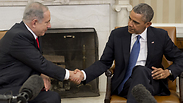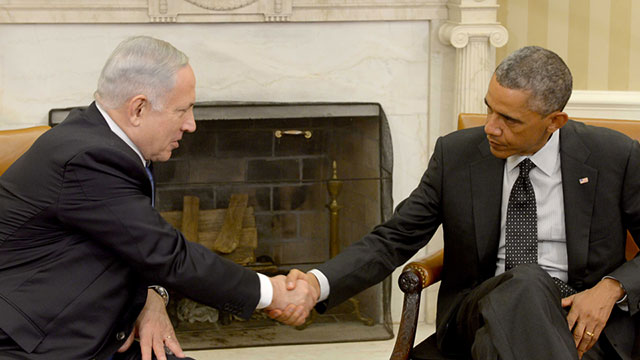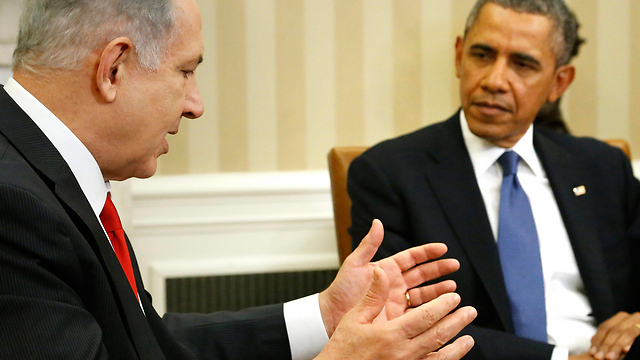
"You can take us out of the United States, but you can't take the United States out of us," says Professor Itamar Rabinovich; and the other five interviewees – all of whom, like Rabinovich, served in the past as Israeli ambassadors in Washington – concur. All six are well-versed, involved, interested and, these days, primarily concerned.
Of the six, a few returned from Washington not too long ago, while some still remember the Israeli strike on the Iraqi nuclear reactor in 1981 and then-president Ronald Reagan's harsh reaction.
Moshe Arens, the senior member of the group, was there in the early 1980s; Moshe Arad served in Washington in the late 1980s; Rabinovich did his stint during the course of the peace talks with the Palestinians under Yitzhak Rabin and Shimon Peres, and into the start of Benjamin Netanyahu's first term in office; Danny Ayalon went to America at the beginning of the 21st century; Sallai Meridor served as ambassador to the U.S. from 2006 to 2009; and Michael Oren replaced him and returned to Israel in 2013. Two additional ambassadors, David Ivry and Zalman Shoval, declined to be interviewed.

They're from the left, right and center; they were appointed by prime ministers from across the political spectrum; and some were appointed by a Labor prime minister and ended their terms in office under a Likud government. They are very familiar with the ins-and-outs of American politics; and they are well aware of the damage being caused by the current crisis in Israel-US relations in the wake of Netanyahu's decision to address a joint session of Congress two weeks before the Knesset elections.
When Reagan was angry with Begin
Five of the interviewees urge the prime minister to forgo the trip and address to Congress. The damage outweighs the benefits, they say. Even Meridor, a born-and-bred Likudnik, doesn't think it's a good idea. Arens is the only one who supports the prime minister's decision. "It's good that he's going," Arens says. "He has to go. The agreement in the works with Iran is bad for Israel, and everything must be done to stop it."
Ayalon: "The issue is constantly making the headlines in the United States, and it's creating negative sentiment against Israel. Until now, Israel has enjoyed bipartisan support; that was our strength. And now Netanyahu is forcing the Democrats to choose between their president and a foreign prime minister. The Republicans feel uneasy too."
Oren: "Netanyahu is duty bound to express his opinions and concerns regarding the agreement in the works with the Iranians, but he doesn't have to do it before the two houses of Congress. True, we are dealing with an existential threat, and we are truly at odds with the U.S. administration in this regard, but there's no need to quarrel with the president. He can certainly address the AIPAC convention and hold private meetings with senators and members of congress. Just as he is duty-bound to preserve Israel's security, so too is he duty-bound to preserve our relations with the United States."
Rabinovich: "Israel, as a state, and its prime minister cannot afford to get into a fight with the American president. Moreover, he stands to lose more than he may gain – not only will he fail to change American policy, but the limits of his power will also be exposed. Israel has always had bipartisan support in the United States. It mustn't be dragged now into a party struggle. Regrettably, House Speaker John Boehner, who invited Netanyahu, is using him somewhat to butt the president. They, too, are playing politics on our backs."
The prime minister is determined to go and believes wholeheartedly that it's the right move. If you were his advisers, would you try to persuade him otherwise?
Meridor: "I didn't think the trip was good for Israel from the start. It undermines some of our vital interests and could hamper our relations further down the line. In the past, even when there were conflicts between Yitzhak Shamir and George Bush or between Reagan and Menachem Begin, they were perceived as disputes regarding the heart of the matter. This is not the case this time."
Nevertheless, perhaps the prime minister is doing the right thing by insisting on addressing the Iranian issue and trying to undermine the agreement in the works?
Meridor: "The prime minister is right insofar as stopping Iran from becoming a nuclear threshold state is concerned. The problem is that his actions are making it difficult for the Democrats in Congress to come out against Iran because in doing so they could be seen as disloyal to their party or president. I hope the rift can be mended. The idea to address the AIPAC members as an alternative is the right one."
Arens: "I get the impression that I'm the only one defending the prime minister's decision. But you don't need me; read Henry Kissinger's testimony before the Senate at the start of the week. He said the agreement that is coming together is very bad. Therefore, the prime minister must go and try to sway them."
Even at the cost of damaging our relations with the United States?
Arens: "The relations haven't been damaged at all and won't be, because there are reservations about the agreement among both parties. There are Democrats, too, who oppose it. In my opinion, the relations were good and will remain good, so I don't see any cause for concern. It doesn't even come close to the situation after the attack on the Iraqi nuclear reactor. I was in Washington at the time, and I remember how angry Reagan was with Begin and the hold he put on the delivery of the F-16 aircraft to Israel. I went and spoke with senior government officials and explained things. The situation today is nothing like that. There is no rift , there won't be any rift, and the prime minister must go there and present his position."
Ayalon: "The strategic alliance between Israel and the United States is stronger than whoever is occupying the Oval Office or Balfour Street. But the showcase is the relationship between the president and the prime minister; and when this relationship is shaken, our enemies get the impression that the United States no longer supports us. We'd do well to remember that the president is the one who imposes the veto in the UN Security Council and not the speaker of the House."

So what is there to be afraid of? The relationship between Netanyahu and Barack Obama has never been particularly warm and will probably remain cool after the address to Congress too.
Rabinovich: "Cool is an understatement. The problem goes beyond Obama. You need to realize that the demographics in the United States have changed. The future is likely to bring another Democratic president because half the voters are Hispanic or black, and the Republicans will have a majority in Congress due to the electoral system and electoral districts."
Oren: "One of the most difficult experiences I had as ambassador under Netanyahu was my attempt to explain to him how to conduct himself with Obama in light of my assessment that Obama would win a second term in office. The prime minister struggled to accept it; he probably thought Obama was a one-off phenomenon. I had to explain repeatedly that Obama was going to be elected for a second term."
Meridor: "I remember Netanyahu's first visit to Washington after being elected prime minister in 2009. Then, too, he came to speak to Congress. I saw that Obama's team didn't do much to promote a relationship of trust between the two. His people surprised Netanyahu when it came to a number of issues, including the settlements. There were ambushes on the way to Congress too. I'd be the last one to say that Netanyahu alone is to blame for the tensions that have arisen."
Rabinovich: "I was ambassador when Netanyahu was elected prime minister for the first time and came to meet Bill Clinton. Clinton said of him after the series of meetings: 'One would think he was the president of the only remaining superpower in the world and I was the prime minister of a small country.' In other words, we shouldn't forget our place."
Arens: "The United States needs Israel. There's close cooperation. The relations are good, and it matters not who will be elected prime minister – Netanyahu or Isaac Herzog."
A slap in the face of the nation
All the former ambassadors speak passionately about the institution of the American presidency and the way in which the Americans admire this institution – not necessarily the individual in office, but the presidency itself. In their view, the prime minister's decision to travel to Washington, contrary to the administration's position, is a slap in the face of the American people, and not necessarily Obama.
Ayalon: "The Americans have a deep respect for the institution of the presidency, regardless of their attitude towards the president. The presidency is more popular than the Congress, and all that has transpired is being perceived as an Israeli maneuver."
Arad: "Obama will remain in office until January 2017. He is the head of the executive branch and the commander-in-chief of the armed forces; he initiates the budget, determines foreign policy and decides when to impose a veto. Right now, he's at odds with the prime minister. It will reflect on the budget insofar as we are concerned."
Oren: "Obama said this week that the Americans don't host candidates before elections; but lo and behold, Vice-President Joe Biden met with opposition leader Isaac Herzog in Munich last week. In any event, Bibi shouldn't go."
Rabinovich: "But if Netanyahu cancels, Boehner, who invited him, will be offended. Therefore, we're in a bind. There's a price to pay if he goes and if he doesn't."
Arad: "Let him address the American Jews via satellite."
Ayalon: "Or he should go as the head of a large delegation that includes the leaders of all the factions; and then the president will welcome them."
The interviewees are not short of criticism for the US president too. Rabinovich, an expert in the history of the Middle East, believes that Obama has failed to internalize the rules of the Middle Eastern bazaar. "Obama and his administration have also made mistakes," he says. "They were too soft on the Iranians. He hasn't internalized the rules here."
Oren: "Regardless of the current affair, we need to realize that Obama is a president who is building a legacy. The party isn't his main concern; what matters to him is how he will be remembered. We're dealing with an ideological government. I believe that a Meretz-led government would also struggle to fall in line with the ideology of Obama, who makes no distinction between an apartment balcony in Gilo and a neighborhood in Yitzhar."
Can we now expect a harsher tone towards Netanyahu?
Rabinovich: "Not in the run-up to March 17. The Americans have realized that aggressive measures against Netanyahu will play into his hands and hurt the opposition; so despite all the anger, they will bite their lips. If Netanyahu is re-elected, the bleak forecasts will materialize, and there'll be no guarantee of a veto in the Security Council for a unilateral initiative on the part of the Palestinians."
Ayalon: "I don't think Obama will speak out more strongly against Netanyahu. He doesn't have to, because the media outlets are doing the job for him. One needs to remember that Israel cannot exist without the United States. When we achieve full economic independence, when we have the ability to manufacture F-16s and have veto power in the Security Council, we may be able to act as we please. But as long as things remain as they are, there's no substitute to the United States. Unfortunately, the current conduct is serving as a tailwind for the president and is allowing him to sign a bad agreement with Iran."
Arens: "Every American feels uncomfortable when he sees Obama and Bibi at odds. We'd like them to agree on everything, but that's impossible."
Arad: "I would like to quote the CEO of Anti-Defamation League, Abe Foxman, who's at the center of the American political spectrum and has called on Netanyahu not to travel to Washington due to concerns that that the move could damage Israel-US relations or harm the American Jewish community."
Why would it harm the Jewish community?
Arad: "If the prime minister is perceived to be meddling in US politics, it has implications for the Jewish community."
Meridor: "I do not think it has an effect on the Jewish vote. AIPAC officials haven't said a word on the subject and they probably know why. I hope the prime minister hears their silence."
Rabinovich: "It's not merely silence; it's a deafening silence."
Embarrassment, disbelief and anger
The former ambassadors are very concerned by what they are hearing from friends in the American administration and of the Congress and Senate. Yes, they still have close ties there. Meridor recently returned from the United States and says he was privy to grave concerns on the part of individuals who truly care about Israel. Ayalon, who is teaching a semester at Yeshiva University in New York, speaks of embarrassment and concern among Israel's supporters on Capitol Hill.
Oren: "I am hearing embarrassment, disbelief and anger. Even Republicans are questioning the move. And beyond that, I can't tell you what they are saying about Bibi. We were at odds with Obama in the past over core issue like the Iranians and the Palestinians, and sometimes we adopted positions that conflicted with those of the administration' but as an ambassador there, I always stuck to the rules of the game."
Can the relations be repaired?
Arens: "The relations are excellent. There's nothing to repair because they aren't broken."
Oren: "We need to reach out to communities that have a major influence on the administration, like the African-American community, the Latino-American community and the LGBT community. I am particularly concerned about this aspect because the head of the black faction in Congress, John Lewis, an American legend and a pro-Israeli politician, declared this week that he views Netanyahu's trip as an affront to the first black American president. More so than anything, we need to convince the Americans that we are willing to take action on the ground, to restrict construction to areas that will be included in our borders, and to present a convincing and serious political framework."
Ayalon: "Whoever is elected prime minister on March 17 will have to meet with the president and tell him what Israel can and cannot do. In addition, he needs to present a political initiative that is of our making, that gets the backing of the United States and that draws in Europe and the moderate Arab states. As I understand it, it needs to begin with a long-term interim settlement."
Rabinovich: "Trustworthiness is of the utmost importance to Obama. He has no problem with being told no, but he doesn't like to be played. If Netanyahu cancels the visit, Obama will see it as a gesture. After the elections, the United States will wait to see what kind of government is established and what policies it will adopt vis-à-vis the Palestinian issue. If it's a government that's going to build in the territories, the relations will deteriorate rapidly. President Obama believes he knows better when it comes to the Middle East, and that the Palestinian issue reflects on everything. There are presidents who change their minds when they enter the Oval Office. It hasn't been the case with Obama, and that’s why his relationship with Netanyahu ran aground from the outset."
Fix the mistake
As individuals who know just how difficult and complex the role of ambassador in Washington can be, the interviewees are not willing to criticize the conduct of the current ambassador, Ron Dermer – but they certainly don't envy him.
Arad: "I read recently that it's been more than six months since he last met with the national security advisor."
Ayalon: "I'm sure it affects him very badly. It's his job to build a coalition of support for Israel that includes Republicans and Democrats, Hispanics and Evangelists. Instead, he's facing a wall of opposition. The American media is full of reports about him not having access to the White House. There are those who are saying that Netanyahu is now going to lay the blame on Dermer – either he'll bring him back to Israel or he'll appoint him ambassador to the UN and Ron Prosor as ambassador in Washington."
Why do you think Netanyahu is acting in this way?
Arens: "He is motivated by the sense that as prime minister, he is duty bound to do all he can to delay the agreement. Obama's position is also understandable; he desperately wants to come to an agreement and is concerned about Congress' reaction."
Arad: "In my opinion, Netanyahu is being spurred on by his ego."
Rabinovich: "He's spurred on by a mixture of a messianic approach to the Iranian issue and domestic political considerations."
Meridor: "If he were to convince me that his actions were of benefit with regard to Iran, despite the cost of the damage to our relations with the United States, I'd support him. But we are paying a double price, and Congress in the end isn't united against Iran. His appearance before Congress won't be beneficial and may even hurt the things for which he is going there."
Rabinovich: "He made a mistake – period."
Arad: "But the mistake can be fixed, and we can move over from public diplomacy to traditional diplomacy."
Meridor: "I want to believe that things are being done in the best interests of Israel. Netanyahu understands and is experienced; but even if his intentions are desirable, the results themselves may be the opposite."















